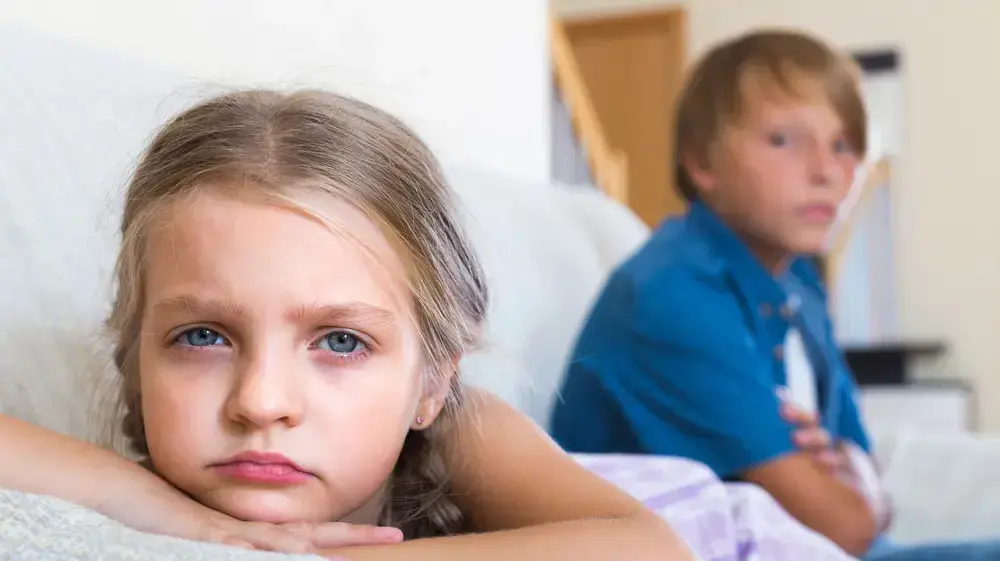Do you have one child who is sociable and another very shy?
You should read this
Lots of parents are raising siblings who are very different from each other, and that difference can be very complex when it comes to social skills, and especially the great freedom.
How can we be happy with one without feeling sorry for the other?
Here are some important tools
Walla!
health
13/06/2022
Monday, 13 June 2022, 07:13 Updated: 07:25
Share on Facebook
Share on WhatsApp
Share on Twitter
Share on Email
Share on general
Comments
Comments
What does a parent do when two siblings grow up in his house whose lives and conduct are very different from each other, perhaps even opposite?
For example, one distant and isolated brother, who is dealing with social anxiety, and a sister who is just the opposite - a "social animal" who is self-confident, active and accepted.
He spends whole days in his room, looks down when invited, is ashamed to respond in WhatsApp groups (or is not in them in the first place), does not go on walks and outings, does not make friendly connections and is convinced that no one wants his company.
She, on the other hand, addresses people freely and is happy when approached, going out and hanging out with friends and friends, opening WhatsApp groups herself, enjoying meetings and events, and also initiating such initiatives, confident in herself and her social connections.
More on Walla!
The child avoids meeting friends?
This is what you need to know
To the full article
And now, add to these differences one more significant condition: the great freedom.
She is - in great anticipation of freedom, which will extend the range of hours in which she is available for recreation, dating and friendships.
And he - whether anxious about him or perhaps with great relief towards him, does not plan to take part in it.
On leave, in the absence of the obligation to attend school, he is not forced to talk to anyone, even if it costs him severe loneliness.
Children and youth with social anxiety may spend the entire period of the great holiday, from late June to early September, alone.
Our parenting role binds us toward each of our children individually - and together.
Two brothers after a fight (Photo: ShutterStock)
These days, as the great freedom is approaching, so are the fears and inconveniences of parents.
When one of the siblings is sociable and active, celebrating the freedom in activities, summer camps, traffic trips and just meetings at sea or in the pool, and the other faces social anxiety and does not enjoy all these, the gap sharpens the difficulty, can be painful and frustrating, and raise quite a few dilemmas. And the accompanying emotions.
How can we celebrate and rejoice with one another without pity for the other?
How do we maintain both, contain the differences in conduct and feelings, and allow each and every one of them to be as they are and good for them, and are there steps that should and should be taken to help, alongside the same acceptance?
More on Walla!
It's not you, it's them: the way to survive quarrels between brothers
Violent quarrels between siblings affect the psyche even years later
Rebecca Zeida: "Our method of treating acne has already helped 50,000 people"
One of the topics that comes up frequently in lectures, groups and tutorials for parents, is gaps in the home, differences between siblings.
This is the longest relationship in a person's life, and it affects and is greatly influenced (also) by us, the parents.
When there is a great difference between the siblings, the parental conduct towards each of them separately and towards both together can be very significant to their feelings towards themselves, towards their siblings and in relation to the relationship between them.
We all know that "do not compare siblings", but we also all know that in practice - it is not really possible.
It's in our nature.
What can be done?
Do our utmost, in awareness and choice, so that this comparison does not activate and manage us.
Be very aware of the issue, the uniqueness of each sibling, our expectations of them on different occasions, check what activates us and how, and be responsible for our reactions to them, because each child is a world and its fullness and our parental role obliges us towards each of our children individually - and together.
We asked Efrat Hanan, coordinator and facilitator of parenting at Rakefet, to map 4 common "traps" for parents of siblings, and specifically those whose children are very different from each other in the social aspect, and who should be careful not to fall into the content:
1. Do not externalize to the children the comparison between them, not even covertly
Most parents know not to say "look at your brother" or "your brother your age was ..." and manage not to mention an explicit comparison to the brother, but it is much more than a verbal comparison.
Many times it is about body language, the look in the eyes, the critique he has anticipated, a small bite and countless verbal and non-verbal ways.
As a parent, it is a matter of incessant self-work and internal discourse not to compare.
The comparison is natural, it is very difficult to avoid it completely, but one should strive, strive, and start first of all in self-discourse, internally, so as not to convey the comparison, worry and disappointment, even in non-verbal ways.
Maintain a neutral and similar dialogue between the children.
Brothers (Photo: ShutterStock)
2. Do not pity
As parents, we tend to pity the child with social difficulty.
We see him in his loneliness, and even more so when she is highlighted by his brother (or sister)'s bustling social life.
We are worried, we look at him with eyes full of fear and sadness.
But he does not need our mercy.
In fact, he needs from us the exact opposite.
He needs our faith in his abilities, especially when there is someone in the house so different from him, who emphasizes and amplifies his difficulty.
His self-image is also so low, he already thinks something is wrong with him, so at least in our parents' eyes, he should be portrayed as okay and capable.
A nice image is to see for ourselves his appearance: if he sees in our eyes an appreciative, respectful, trusting and believing look in his abilities he is more likely to permeate his feelings towards himself.
If he sees pity, worry, disappointment there - so will he see himself.
3. Do not have a different dialogue with the children
When there are two children so different, the discourse in front of them is different.
Naturally, we will trust the child who has no social difficulty, we will allow him more, we will release more.
On the child with social anxiety, the one who finds it difficult and avoided, tends to protect more and restrict or demand less from him.
Thus, we will only ask the socially strong brother to help with tasks (and certainly those that require communication with people: 'Go get it from the neighbor ...') and in extreme cases we will even use it for his brother ('Take him with you', or 'Arrange for him', etc.).
Precisely from this place, one should pay attention to communication in front of the two children and balance.
Not to make assumptions in advance, not to expect only from one and spare the other, to allow both children to take part and feel capable and helpful, and in general to maintain a neutral and similar character and discourse between the children, which does not produce and perpetuate gaps.
4. Do not miss any success - small or large
A lot of parents share how hard it is for them to see successes.
The expectation for change and improvement is so great that along the way they miss what is good, the progress, what succeeds and works - when it feels "too small", not significant enough.
In children with social anxiety the progress is often slow, non-linear, the successes small, but no less significant.
If one compares to a brother or sister, the difficulty of seeing the achievements is great, because they seem so small, and almost non-existent, but the progress should be measured in relation to the child himself, and not to where the brother is.
This is a very important point and to me, a key point in our ability to support a child dealing with social anxiety.
You should always try and improve
It is important to remember - the comparison to siblings does not promote, the desire to be similar in their strengths is both unrealistic and harmful.
It hurts the child, it hurts relationships within the family, and it hurts our relationship with the child (and his own with himself).
If our goal is to strengthen and empower, comparing to a brother or sister who is not dealing with social anxiety is actually one of the things that inhibits and prevents change.
It is important to avoid judgment and criticism and to be constantly aware of the issue.
Of great importance is our parents' ability to see the child as he is, his achievements, his abilities, detached from his brother.
It's not always simple, and we are unlikely to always succeed (which is natural), but it's always worth trying and improving.
The great freedom is a very important opportunity for all of us to prepare in advance and avoid these mines, in order to give (all) our children a family space that contains, accepts and grows.
On June 22, a dedicated webinar for parents on the subject of great freedom will be held in Cyclamen.
Participation is open to everyone and free of charge https://rakefet-group.org.il/
health
parenthood
Tags
social anxiety
Shyness
anxiety
Siblings
parenthood








